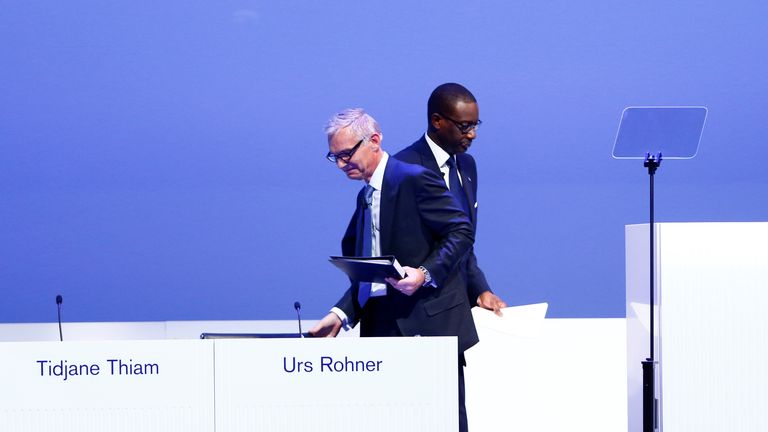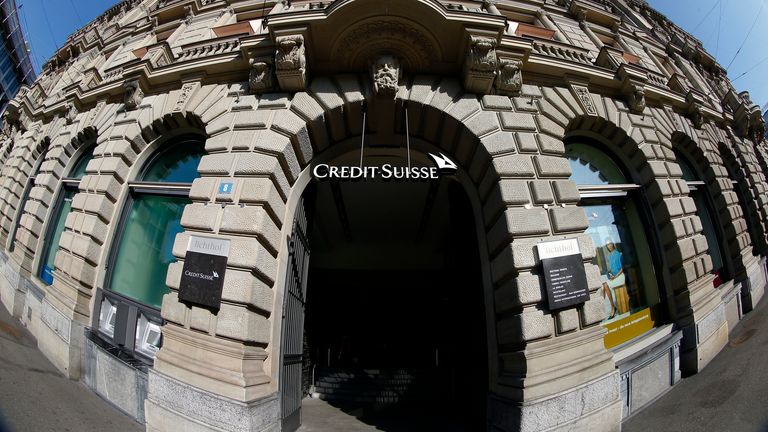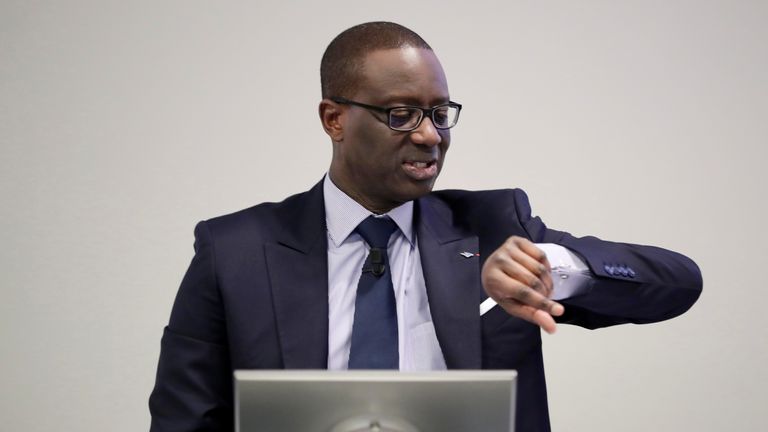Credit Suisse power struggle ends in chief walking the plank
The treatment of the charismatic financier is likely to draw allegations of a Swiss cabal, seeking to protect their own interests.
Monday 10 February 2020 08:00, UK
The departure of Tidjane Thiam as chief executive of Credit Suisse, after a boardroom power struggle that followed a spying scandal, is genuinely shocking.
Mr Thiam, who won a huge City fan club for his successful stewardship of insurer Prudential before taking the job at Credit Suisse, was thought to have seen off any threat to his authority.
The leading shareholder in Switzerland's second-largest bank, along with other investors, had all publicly supported Mr Thiam in recent days.
If there was to be a head to roll in the boardroom, it was assumed, it would be that of the bank's chairman Urs Rohner.
As it turns out, it is Mr Rohner who has won the day, with Mr Thiam walking the plank.
It was pretty untenable for both men to remain in their job after FINMA, the Swiss financial regulator, said it would investigate a spying scandal at the bank.
The scandal erupted after Iqbal Khan, who had been hired by Mr Thiam to look after wealthy clients, defected to Credit Suisse's bitter rival UBS.
He subsequently claimed he was followed in the streets of Zurich by private investigators and complained to police.
The Credit Suisse board launched an investigation which exonerated Mr Thiam of knowing anything about Mr Khan being trailed, but decided that Pierre-Olivier Bouee, the bank's chief operating officer, head of security and a long-time lieutenant of Mr Thiam, had ordered the investigation.
Mr Bouee, who in his time at the Pru was nicknamed "POB", resigned along with another member of the bank's security team.
In the meantime, it emerged that a private investigator who had acted as a middleman between Credit Suisse and the detective agency that trailed Mr Khan had killed himself.
Mr Thiam movingly read a letter sent to him by the dead man's family when he first spoke about the saga in October last year.
The affair heightened tensions between Mr Thiam and Mr Rohner and, once the regulators began investigating events at the bank, there was a sense that one of them would have to go.
Mr Rohner was seen as the more vulnerable due to the extent of Mr Thiam's support among shareholders, particularly from the US and the UK, who were happy with the job he had done.
Although the share price of Credit Suisse remains lower than it was when he arrived in 2015, investors felt Mr Thiam was successful in refocusing the bank away from traditional investment banking activities and towards wealth management.
The bank's balance sheet had been tidied up and, after several years of losses, it had been restored to profitability.
Some two-thirds of its earnings now come from wealth management.
David Herro, chief investment officer at Harris Associates, the Chicago-based fund manager which, with 8.42% of Credit Suisse is the bank's biggest single shareholder, even said earlier this week that he would seek to remove Mr Rohner unless he got behind Mr Thiam.
He told the Wall Street Journal this week: "Our point is very simple. If it comes to a choice of who stays and who goes, do you keep the successful CEO, who has taken all the right steps, or do you keep the person who has been the cause of or been present for all the things that have hurt the bank over the past years? We urge the directors of the company to make the right choice."
He highlighted the various penalties and fines that Credit Suisse incurred when Mr Rohner was chief operating officer at the bank.
A second shareholder, the US hedge fund Eminence Capital, also said this week that it was "increasingly disappointed with the actions taken by the board of directors, which has displayed an utter lack of support for the CEO".
Mr Rohner also has critics in Switzerland itself.
Ethos Foundation, an influential investment adviser, called on Thursday for Mr Rohner to take responsibility for the spying scandal and step down.
In the Credit Suisse statement, announcing his resignation, Mr Thiam again repeated that he had not known about the surveillance.
He added: "It undoubtedly disturbed Credit Suisse and caused anxiety and hurt. I regret that it happened and it should never have taken place."
Credit Suisse's board will desperately hope that Mr Thiam's departure brings the matter to an end.
That is unlikely, not only because FINMA is still investigating the issue, but also because a big proportion of the bank's shareholders are likely to be furious.
The treatment of Mr Thiam is likely to draw allegations of a Swiss cabal, seeking to protect their own interests, at the top of the bank.
The clannish Swiss establishment, it will be argued, has thrown the chief executive, a conspicuous outsider, under the bus.
As for Mr Thiam, who was once described by a City insurance analyst as "having a brain the size of two solar systems", he will not be short of job offers.
For many years he was linked with a return to politics in the land of his birth, Cote D'Ivoire/Ivory Coast, where he was once minister of development.
He ruled this out two years ago.
However, every time a top job in finance comes up in coming months, he is likely to be linked with it.
HSBC, whose chairman Mark Tucker was Mr Thiam's immediate predecessor at the Pru, is yet to name its new permanent chief executive.
Similarly, Lloyds Banking Group has reportedly begun the search for a successor to Antonio Horta-Osorio, its chief executive for the last nine years.
Mr Thiam himself, while having made Zurich his permanent home, also retains strong ties to the UK.
He is still thought to have a season ticket at Arsenal, the football club he has supported for many years, despite not being able to visit the Emirates Stadium regularly in recent years.
It would be no surprise to see this most charismatic of leaders back in the Square Mile before too long.









